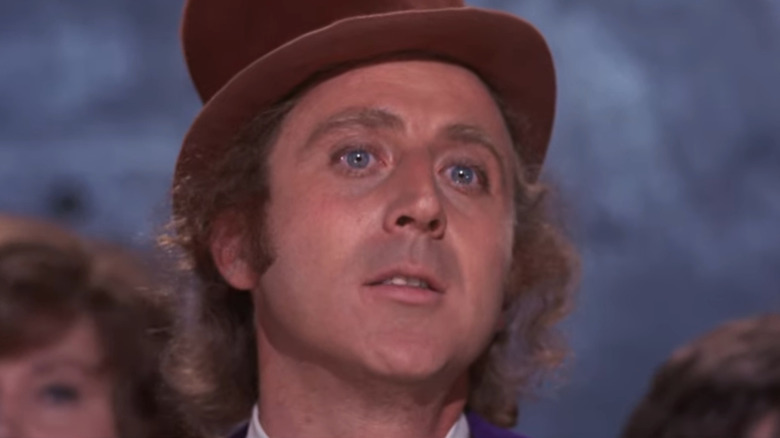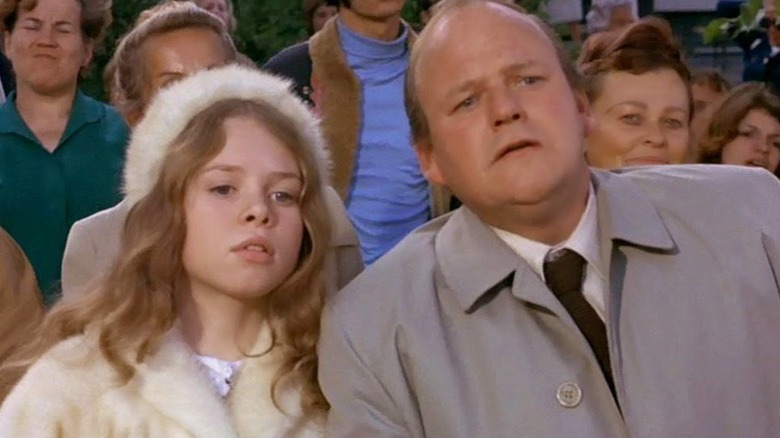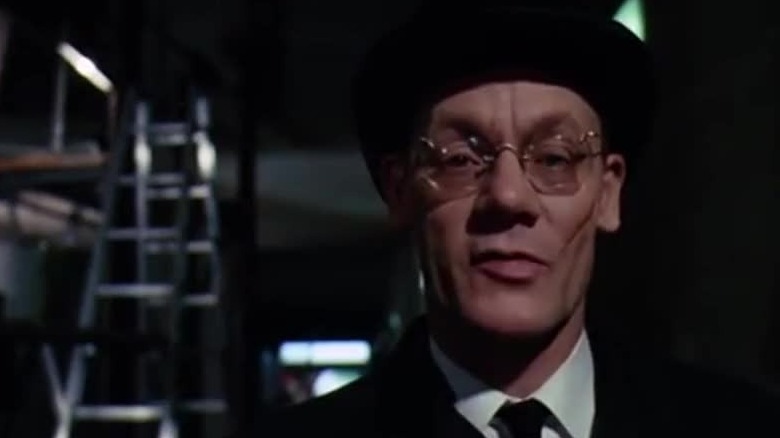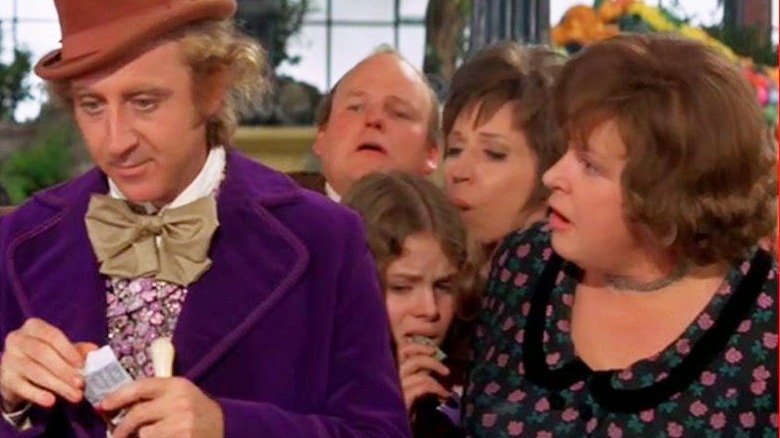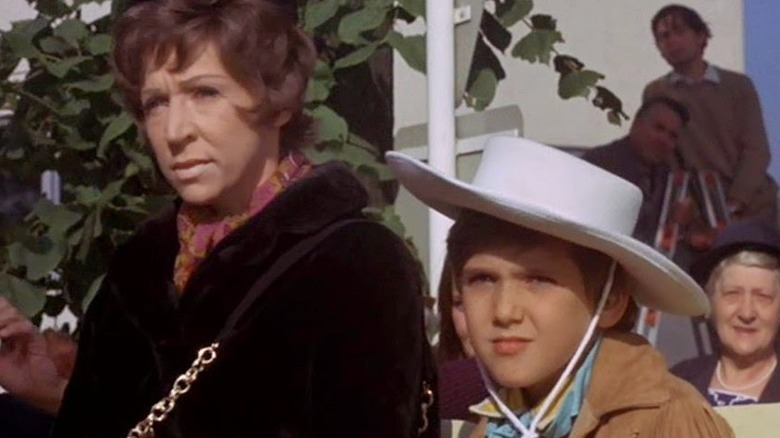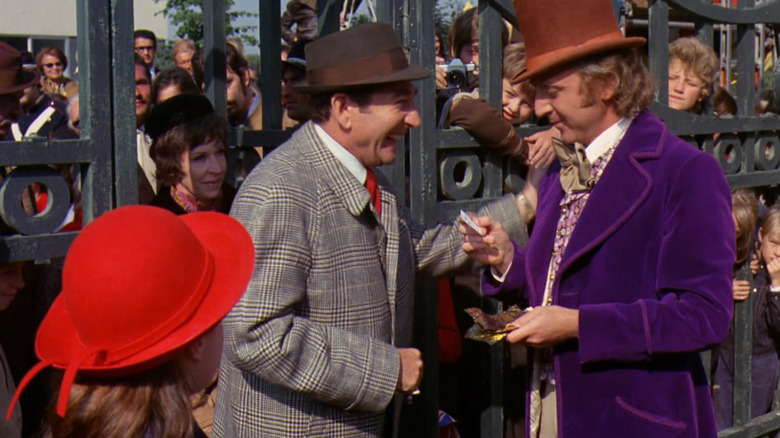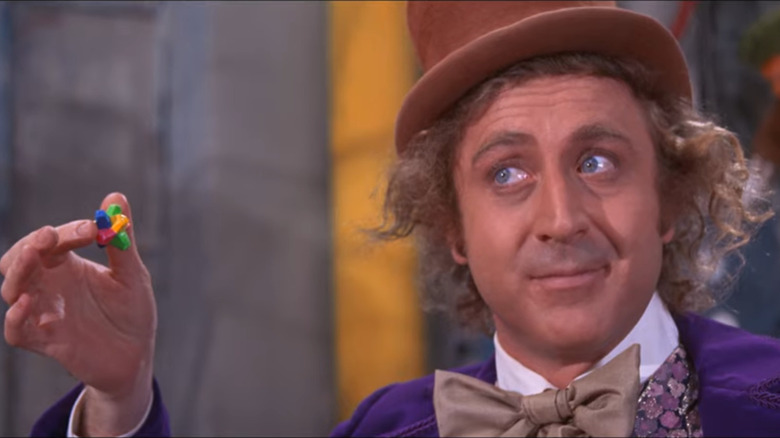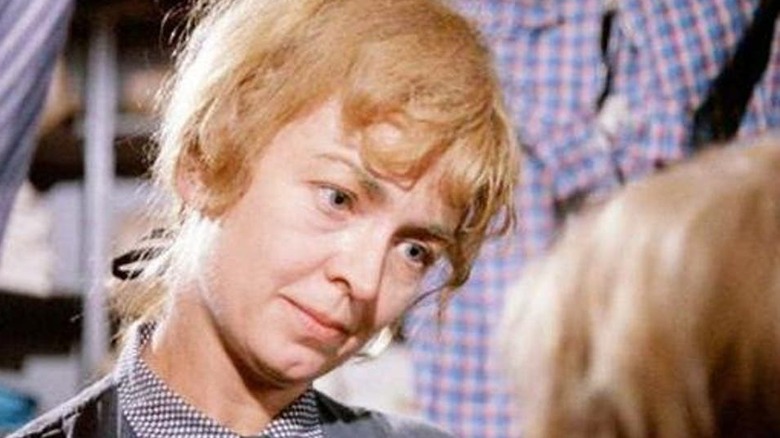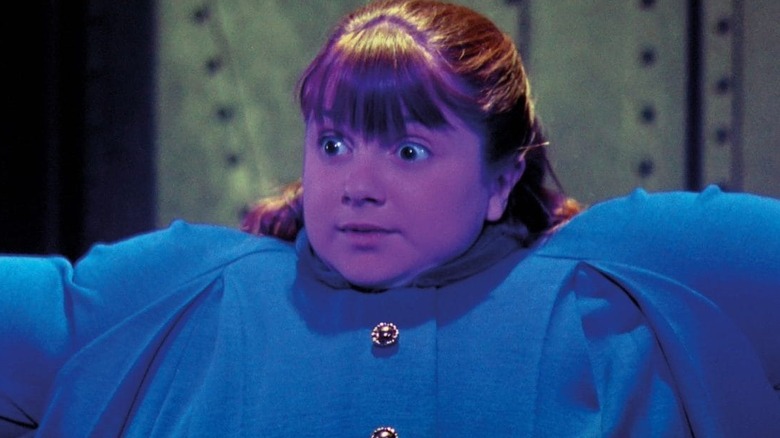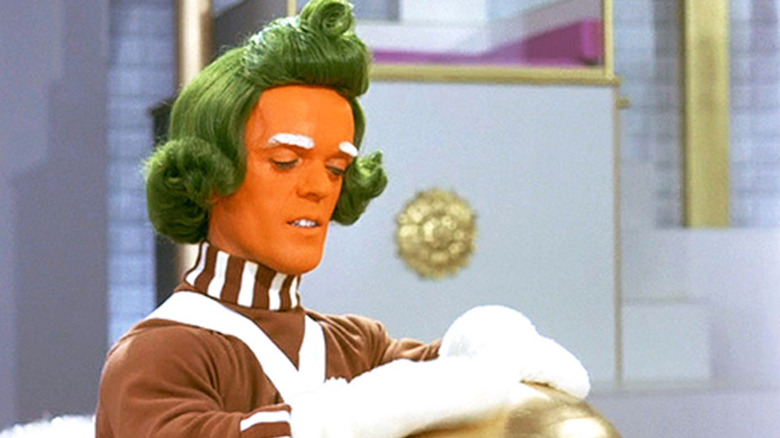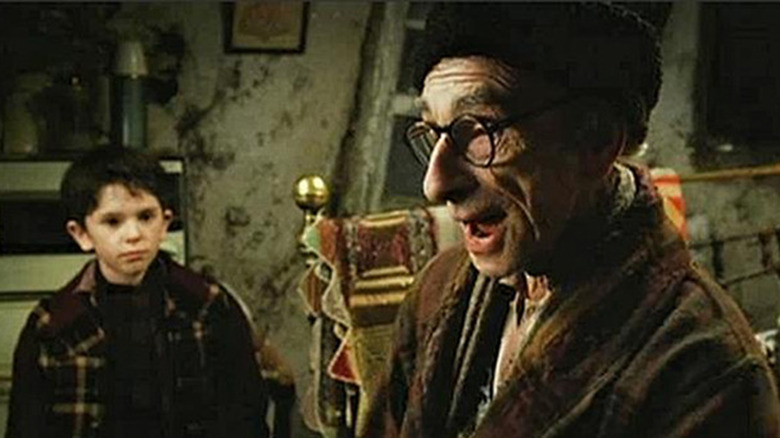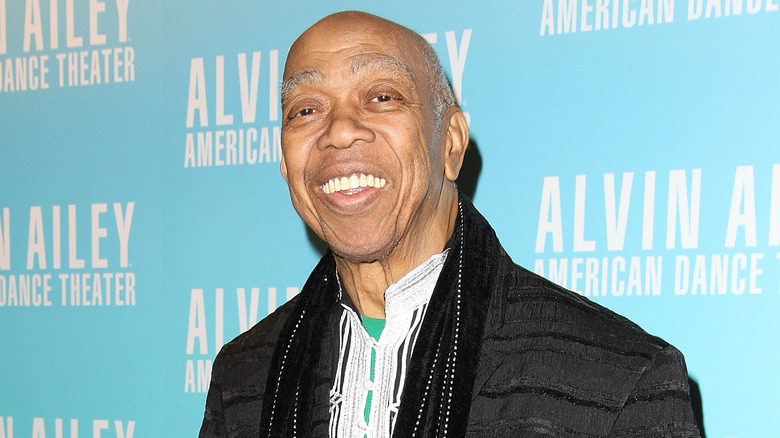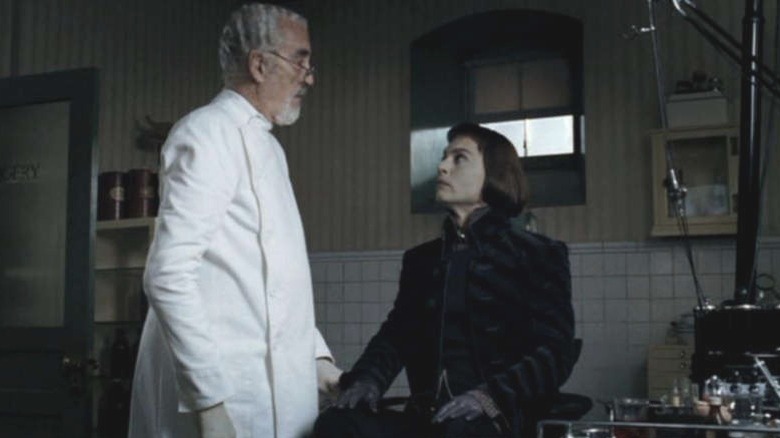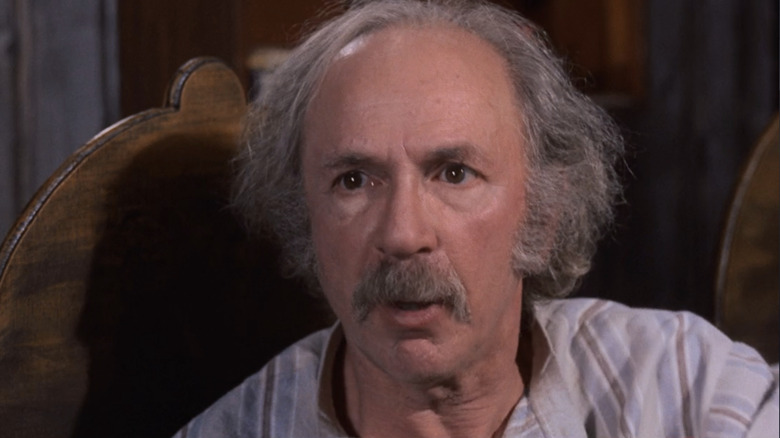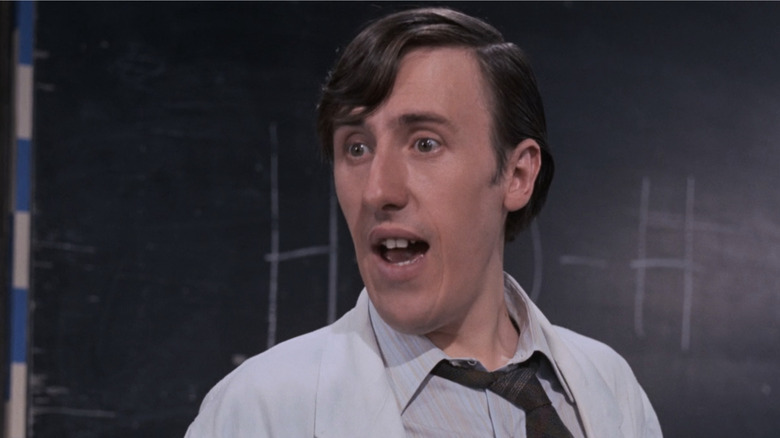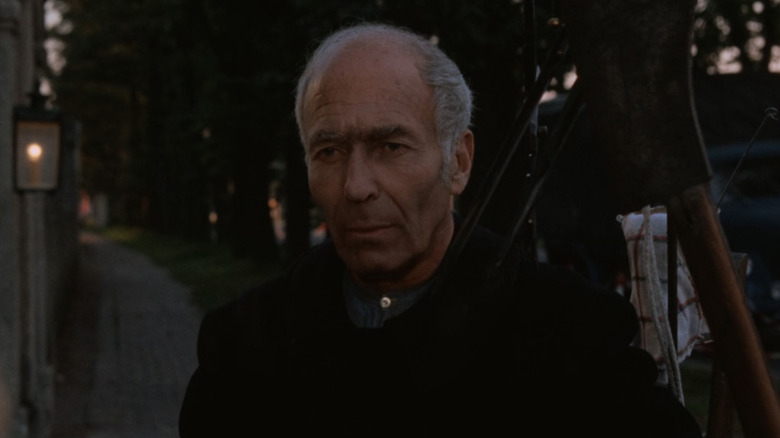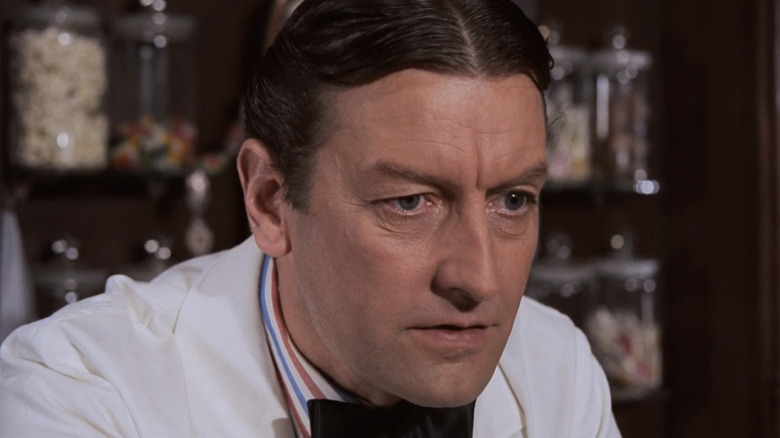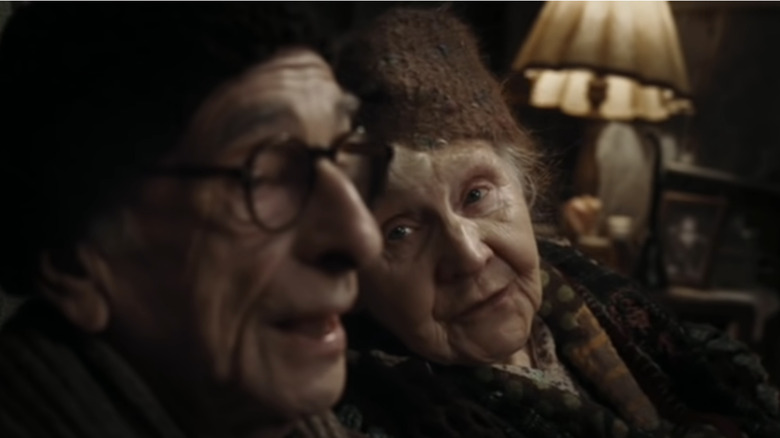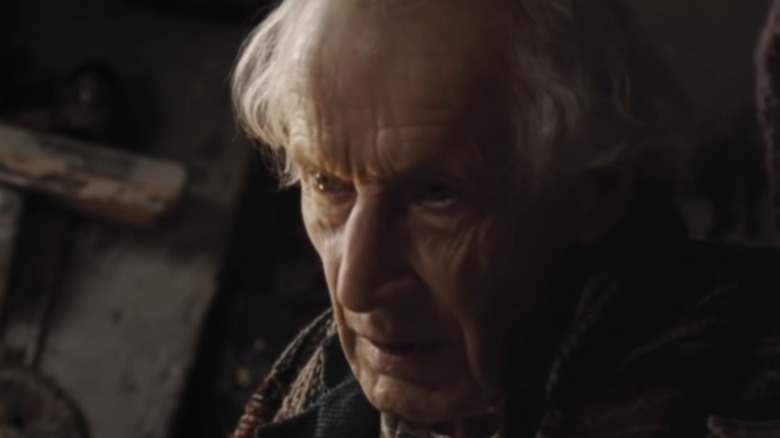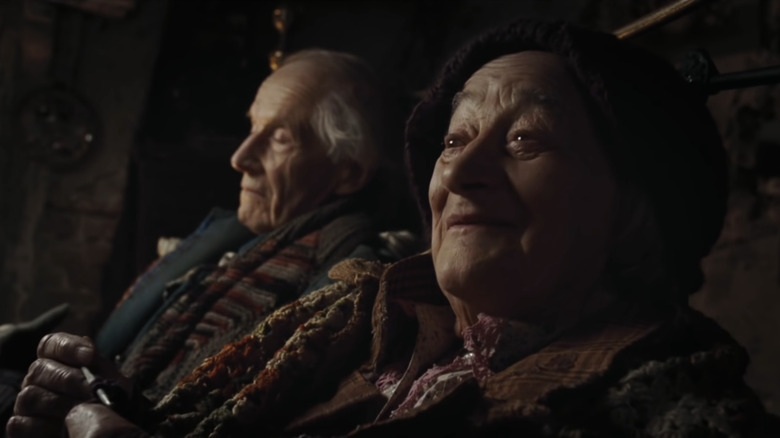Willy Wonka Actors You May Not Know Passed Away
A full half-century after the film's release, it's hard to imagine "Willy Wonka & the Chocolate Factory" as anything other than the beloved timeless classic that it's become. But when it opened in 1971, it was far from a box-office success, barely pulling $4 million in for a film that cost $3 million to make. Neither the actors nor the characters were household names, and Roald Dahl, the writer of "Charlie and the Chocolate Factory," absolutely hated the movie adaptation. But time heals all wounds, and, over the decades, "Willy Wonka & the Chocolate Factory" found its way into fan's hearts and unexpectedly durable pop-culture relevance.
Still, that didn't stop Hollywood from trying again in 2005, this time securing director Tim Burton and the blessing of Dahl's family to re-adapt the book more faithfully into "Charlie and the Chocolate Factory." Though it hasn't quite warmed hearts like the original, Burton's quirky vision has its share of fans in its own right. The 1971 film may seem eternal, and the 2005 adaptation may seem like it just happened yesterday, but "time," as Wonka admonishes Veruca Salt, "is a precious thing." It never stops marching forward. Sadly, over the years, we've lost a number of beloved actors from the Chocolate Factory. So to help keep track of those we've lost, here are some actors who you may not know passed away.
Roy Kinnear's life was cut tragically short
Pity poor Mr. Salt. All the money in the world, and nothing he could do would ever be enough for his greedy, grasping daughter, Veruca Salt. Or don't pity him. He may have broken into a sweat every time he heard his daughter's voice demanding something new, but spoiled children don't just pop out of thin air. Though American audiences may not have recognized the elder Salt, he was played by one of Britain's most famous funnymen at the time, Roy Kinnear. The actor appeared in TV and movies, but it was probably his roles in "Willy Wonka" and Richard Lester's epics "The Three Musketeers" and "The Four Musketeers" that made him most familiar to international audiences.
Unfortunately, though he didn't know it at the time, it was also the Musketeers that would lead to his death. While in Spain for the third film in the series, Kinnear's horse slipped on cobblestones that shouldn't have been wet by the film crew. Kinnear, who hadn't been given much time to practice riding, fell off and broke his pelvis. He died a few days later on September 20, 1988, of a heart attack brought on by the injury. His family sued the production company, and years later received a £650,000 settlement, with the Spanish hospital paying a large lump of it. It was a sad, tragic end to one of Britain's greatest funnymen.
Günter Meisner made a career out of scaring folks
Willy Wonka can say whatever he likes at the end of the film about Slugworth working for him, but generations of children know that this bespectacled faux spy will always be nightmare fuel. He appears like a wraith in dark alleys and whispers sinister nothings into children's ears — and just how the hell was he always able to show up whenever someone found a Golden Ticket? The man couldn't have even been human. Wonka was wrong; Slugworth was most definitely someone to be fear.
And while Slugworth may have succeeded in scaring generations of children, over the course of his career, the man who gave him creepy life, Günter Meisner, scared a good number of adults, too. Sinister and threatening was a niche the character actor had mastered. He was never afraid to take on villains and Nazis, even playing Hitler a time or two, like in ABC's 1983 mini-series, "The Winds of War." And since Meisner was fluent in English, French, and German, he got his pick of roles the world over. He appeared in big-budget all-star fare like 1976's WWII era drama "The Voyage of the Damned," and made himself right at home in 1978's Hitler clone thriller "The Boys From Brazil." The man died of a heart attack in 1994 while filming the German procedural show "Tatort" at the age of 68.
Ursula Reit struck it big in Germany
Alas Mrs. Gloop, we hardly knew ye. She seemed a nice enough woman, if a bit too indulgent of Augustus' gluttony, but since her child was the first lost to the factory, she was in and out of our lives in the blink of an eye. At least Mrs. Gloop did try to get Augustus to stop slurping up the chocolate river, so let's hear it for parenting. German actress Ursula Reit played Mrs. Gloop's horror to Willy Wonka's suspenseful fascination, having secured the role as the movie was filmed in West Germany.
Of all the actors and actresses to appear in the film, Reit was probably the most mysterious. "Willy Wonka" was her first — and one of her only — roles in an English language film. The rest were all made in her native German. For most viewers, Reit was ushered into and out of their lives along with Mrs. Gloop. But for German audiences, Reit never stayed off the screen for long, acting steadily into '90s before she died in November of 1998 at the age of 84.
Nora Denney put the TV in Mrs. Teavee
It always seemed a bit odd that a teacher like Mrs. Teavee would be so indulgent of her son's crippling television addiction, but indulge it she did. But then, maybe she was just giving in to the inevitability of having a son named Mike Teavee. The role almost went to Jean Stapleton, but when she turned it down to star in "All in the Family," actress Nora Denney picked it up without missing a beat. She provided Mrs. Teavee with just the right amount of indulgence and pretentiousness, playing a geography teacher whose know-it-all attitude gets casually brushed aside by Wonka. (Though who can blame her for not knowing where the Oompa Loompas came from, or that they existed at all?)
Before delighting kids in "Willy Wonka," Denney got her start scaring them as Marilyn the Witch, host of Kansas City, Missouri's horror movie show, "The Witching Hour." Back then, she went by Dolores Denney, before shortening her name to Dodo and finally settling on Nora. She made a slew of television appearances throughout the '60s and '70s, bouncing around between hits like "Bewitched," "Green Acres," and "Starsky & Hutch." She even had a small role in Tom Hanks' "Splash" before finally slowing down a bit. Denney lived a full life, though, and died just before Thanksgiving in November of 2005.
Leonard Stone fast-talked his way all over the silver screen
Always remember, folks: With Sam B., it's a guarantee. (Void where prohibited. Guarantee does not extend to the well-being of gum chewers, daughters, or miscellaneous naughty children.) The fast-talking Sam Beauregarde is a salesman through and through, though his attempted charms never fail to fall flat with the eccentric Willy Wonka. In the novel, both he and his wife accompanied their competitive daughter Violet to the factory, but for the film, one Beauregarde was plenty. Maybe he indulged his daughter a bit too much, but at least he wasn't the utter doormat that Veruca Salt's father was.
Leonard Stone played the car salesman who delivers such deliciously memorable lines as "Violet, you're turning violet, Violet!" Stone was one of the better-known "Wonka" actors, appearing on dozens and dozens of shows over his 50-year career. If it was a popular series in the '60s, '70s, and '80s, you can bet Stone showed up on it. Hell, in 2000, he even showed up as a contestant on "Wheel of Fortune," and towards the end of his life, he voiced an episode of "Avatar: The Last Airbender." Stone was one day short of his 88th birthday when he died of cancer on November 2, 2011.
Gene Wilder left an unforgettable legacy
In the 50 years since "Willy Wonka & the Chocolate Factory" came out, few characters have remained as stubbornly enigmatic as Willy Wonka himself. He seems, at times, both callously unconcerned and warmly encouraging. He delights in showing off his oddities, but it's always hard to tell when he's lying and when he's telling the truth. And that was all famously intentional. As portrayer Gene Wilder explained, he took the role by insisting Wonka's entrance be used to throw the audience off and leave them guessing the rest of the movie whether he was trustworthy or not.
Wilder, of course, was one of Hollywood's great comic geniuses, making classics like Mel Brooks' "The Producers" and "Young Frankenstein," and working with fellow funnyman Richard Pryor on films like "Silver Streak" and "Stir Crazy." Though his last appearance on the big screen had been in 1991's "Another You" with Pryor, and he hadn't appeared on television since a 2003 episode of "Will & Grace," Wilder's star never faded. So when he died on August 29, 2016, of Alzheimer's complications, fans mourned the passing of an old, cherished friend. And just to prove how kind a man Hollywood really lost, it was only after his passing that fans learned he'd hid his Alzheimer's from the world for years, not wanting the truth to rob his young fans of one second of happiness.
Diana Sowle was every Willy Wonka fan's mother
In the annals of movie mothers, few seem as warm and caring as Charlie's mom, Mrs. Bucket. There's just something wholesome and loving about Mrs. Bucket that's hard to put into words. Maybe it's her performance of "Cheer Up, Charlie," or maybe it's just a testament to the kindness that actress Diana Sowle put into the role. She only appeared in the first part of the film, but her presence lasted throughout as Charlie carried the kindness learned from her through his adventures in the chocolate factory.
Sowle didn't make many other films after appearing in "Willy Wonka," only taking on small roles in "Guarding Tess" and "Clear and Present Danger." She was, though, a mainstay in theatre and never lost touch with her "Willy Wonka" fans. The Baltimore Sun snagged her for a 2015 interview when, at the age of 85, she was in town watching the film with fans at the Chocolate Binge Festival. She also had a few choice words for that ingrate, Charlie. "Charlie should've taken his mom [to the factory]," Sowle griped to the Sun in a cheeky dig at her movie son. And when he got Wonka's fortune, "He should've said 'Oh, that's wonderful. Now I can buy my mother a beautiful dress!' Never happened." Truer words were never spoken. Sadly, the actress died just a few years later in 2018 at the age of 88.
Denise Nickerson never forgot her Willy Wonka family
Of all the naughty children from "Willy Wonka," Violet Beauregarde may be the most likable. Sure, they're all varying degrees of defiantly obnoxious (except maybe for poor, oblivious Augustus Gloop), but as far as vices go, gum chewing is pretty benign. Yeah, there's also that competitive streak, but Violet manages to give voice to the people when she snaps at the unbearable Veruca Salt to "Can it, you nit!" Of course, dismissing a grotesquely spoiled brat is one thing, and dismissing the man trying to keep you from eating a potentially lethal experimental "meal" is another. Maybe next time, at least, Violet will know how to keep from turning into a giant blueberry.
Actress Denise Nickerson brought Violet to lip-smacking, gum-chewing, nose-picking life. She got her start in soaps, playing a few connected roles in the time-hopping, supernatural anomaly, "Dark Shadows." She moved to "Search for Tomorrow" after, then joined "The Electric Company" as one of the members of the band Short Circus. Her last role before she retired from acting was in the 1978 comedy "Zero to Sixty" with Joan Collins and Dick Martin. Nickerson always held Violet close to her heart, though, showing up for documentaries, reunions, and fan events, and remaining close to a number of her co-stars. She was, sadly, the first of the children we lost, as she died of pneumonia in July 2019 at just 62.
Malcolm Dixon went on to movie fame
Just read the words "Oompa Loompa" and it's pretty much impossible to keep the song from rattling around in your head. And that's as it should be. The orange-hued natives of Loompaland did the heavy lifting in the film, not just by keeping the factory running and cleaning up after the kids, but by offering up the final, cutting commentary on the crimes of the naughty children. They're an unforgettable, critical part of the film, but sadly, when it was released, not a single one of the 10 actors to portray the Oompa Loompas were credited.
These days, at least, we know who they are. One of those actors was 36-year-old Malcolm Dixon in his first big-screen movie — his first of many. Over the years, Dixon became a staple in fantasy and sci-fi movies, going on to appear in "Flash Gordon," "The Dark Crystal," "Labyrinth," "Willow," and as an Ewok warrior named Leektar in "Return of the Jedi." His biggest role, though, had to have been Strutter, one of the titular dwarves in Terry Gilliam's "Time Bandits," who stole a priceless map to guide them through time. He died just recently, on April 9, 2020, at the age of 86.
David Kelly made Ireland proud in Tim Burton's adaptation
While the 2005 Burton adaptation didn't exactly bring a slew of new characters, it did bring a number of new interpretations to characters viewers thought they knew well. Charlie's beloved Grandpa Joe, of course, still accompanies his grandson to the chocolate factory, but this Grandpa Joe seems a bit less stubborn and pushy than his counterpart in "Willy Wonka." And while the 1971 version was a believable older man (Jack Albertson, the one-time household name who died in 1981, was just 64 when he played Grandpa Joe), Burton's film version seemed much closer to the uncannily sprightly 96-year-old that Roald Dahl wrote about in his novel.
Veteran Irish actor David Kelly put the spring in Grandpa Joe's step, an easy enough task for a man who'd been acting on stage and screen for five decades by then. Throughout his career, Kelly made memorable appearances in British fare like John Cleese's "Fawlty Towers" and big-screen movies like "Waking Ned Devine." As the Irish Times noted on his death in February of 2012, Kelly had made quite a career out of playing characters older than himself. Though older than Albertson, he was still only 76 when "Charlie and the Chocolate Factory" came out. Who better to breathe some extra life into the ancient Grandpa Joe?
Geoffrey Holder was a true renaissance man
When Burton set out to re-adapt Dahl's novel, he worked with the author's family to make "Charlie and the Chocolate Factory" more faithful to its source than 1971's "Willy Wonka" had ever been. Not content to just rely on storyline and character tweaks, Burton pulled Dahl's words right off of the page and shared them with the world through the soothing bass voice of the Narrator. Maybe not every part of the film worked, but the narration lent a richness to the timeless tale that blurred the line between film and storybook.
Trinidadian-born Geoffrey Holder provided the narration for "Charlie and the Chocolate Factory," and for a man with such an unforgettable voice, it's worth noting that some of his greatest achievements had nothing to do with it. Holder first began his career on stage dancing with the Metropolitan Opera Ballet. He was also an artist, a Broadway actor, director, and costume designer, even winning Tony awards for the latter two categories for his work on "The Wiz." There was nothing Holder couldn't do. Once he moved onto film, he put in memorable performances with Rex Harrison in 1967's "Doctor Dolittle" and faced off against Roger Moore's Bond as the villainous Baron Samedi in "Live and Let Die." "Charlie and the Chocolate Factory" was one of his last roles. When Holder died on October 5, 2014, he left behind a legacy most folks could only dream of.
Christopher Lee could always turn in an imposing performance
Since Burton put so much stock into remaining faithful to Roald Dahl's novel, it seemed odd to tackle a whole new back story for Willy Wonka complete with an entirely new character: dour dad, Wilbur Wonka. But odd is what Burton does, so Wilbur made his presence known in "Charlie and the Chocolate Factory." Wonka's father was a renowned dentist with a totalitarian streak, forbidding his son from eating Halloween candy and ruining his teeth. Once Wonka got a taste of the sweet stuff, though, he was hooked, so he ran off to follow his dreams. By the time he tried to return, he'd found his father, too, had run off — with the entire house.
Burton chose towering, record-breaking film legend Christopher Lee to play Wonka's imposing father, giving him just the right amount of menace and vulnerability. Lee, of course, was a Hollywood legend, with a career dating back to his days as Dracula in the Hammer Horror films of the '50s and '60s. Lee also fought Roger Moore's James Bond as the assassin Scaramanga in "The Man With the Golden Gun," and betrayed the forces of good as Saruman in "The Lord of the Rings" trilogy. He worked right up until the end of his life, playing Saruman one more time in 2014's "The Hobbit: The Battle of the Five Armies." Lee died a year later in June of 2015, shortly after his 93rd birthday.
Jack Albertson was everyone's favorite grandfather
On the one hand, Grandpa Joe, played by Jack Albertson, was Charlie's favorite relative, a trusted confidante who carried the wisdom of age but never lost his sense of childish whimsy. He was, in short, the perfect plus-one to accompany his grandson into Willy Wonka's world of wonder. On the other hand, he is a shiftless layabout who has confined himself to a bed with his wife and in-laws for years, puffing away on a pipe while his family starves, and who only reveals his charade when the moment comes to win a lifetime supply of chocolate.
No matter where your opinion of Grandpa Joe might fall, though, Albertson's warm performance is one of the film's highlights. Born in Massachusetts in 1907, Albertson was practically a living history of 20th-century popular entertainment, starting out as a vaudeville song-and-dance man before moving to Broadway, film, radio, and television. He won a Tony for his performance in the 1964 domestic drama "The Subject was Roses," as well as an Oscar when he reprised his role for the play's 1968 film adaptation co-starring Martin Sheen and Patricia Neal. After "Willy Wonka," Albertson co-starred in one of the biggest box office hits of the 1970s, "The Poseidon Adventure," and won an Emmy for his portrayal of gruff mechanic Ed Brown on "Chico and the Man" opposite Freddie Prinze. He died in 1981 of colon cancer, though kept working up until the very end; several of his final films, including the Vanessa Redgrave abortion drama "My Body, My Child," were released posthumously.
David Battley was another of Roald Dahl's bad teachers
The role of adults in Roald Dahl's stories is always a little grotesque, and the world of teachers and education is even more so. While "Willy Wonka" doesn't sink to the depraved depths of "Matilda," for example, we do get a sense of Charlie's fraught school career in the form of Mr. Turkentine (David Battley), a not-terribly-bright math and science teacher who talks down to his students, capriciously changes weekly schedules without warning, and exposes his students to combustible chemicals. When the news breaks that Willy Wonka is reopening his factory via five golden tickets hidden amongst the world's supply of Wonka bars, Mr. Turkentine dismisses class so that everyone (himself included) can join the hunt.
The son of Labour politician John Battley, David attended the Royal Academy of Dramatic Arts and made a name for himself as a deadpan comic actor, notching roles on "The Benny Hill Show," "Mr. Bean," and the 1966 BBC adaptation of "Alice in Wonderland." Aside from "Willy Wonka," Battley's was most well known for the 1975 sketch comedy series "Rutland Weekend Television." Created by Monty Python's Eric Idle, the two-season show was a parody of low-budget local television programming; animated sequences featured a Beatles-like group called The Rutles, with Battley voicing Paul McCartney stand-in Stig O'Hara. Battley continued to work up through the 1990s and died of a heart attack in 2003.
Peter Capell was an international character actor
When revisiting "Willy Wonka and the Chocolate Factory" as adults, many viewers who loved it as kids are surprised at how scary it can be. The moment when a boat ride down the chocolate river turns into a bad acid trip is infamous, but the film's frights don't start there. Earlier, as Charlie stares through the gates of the Wonka factory, he is approached by a tinker pushing a cart of sinister-looking knives, shears, and cleavers. "Nobody ever goes in," he cryptically intones, "and nobody ever comes out." There are more creepy moments to come, but this scene suggests early on that things might not be what they seem.
The tinker is played by Peter Capell, a prolific German actor who split his time between British, American, and German productions. He made his first on-screen appearance in 1945, co-starring in an early television production of the Maxwell Anderson play "Winterset." For the next decade he worked primarily in television but made notable appearances in the Jayne Mansfield potboiler "The Burglar," Billy Wilder's sex comedy "One, Two, Three," and provided the opening narration for Stanley Kubrick's WWI epic "Paths of Glory." Most of his work from the mid-1960s to his death in 1986 was in Germany, though he can be seen in the 1977 William Friedkin nail-biter "Sorcerer," the 1978 prestige miniseries "Holocaust" starring Meryl Streep, and the Diane Keaton-fronted adaptation of John LeCarre's "The Little Drummer Girl" from 1984.
Aubrey Woods was the original Candy Man
In 1972, the year after "Willy Wonka and the Chocolate Factory" premiered, singer Sammy Davis, Jr. went to the top of the charts for the first time as a solo artist with his rendition of Anthony Newley and Leslie Bricusse's "The Candy Man." But the first recorded version of the song can be found on the film's official soundtrack album, sung — as it was in the film — by actor Aubrey Woods in character as candy store owner Bill. He spends his days doling out Scrumdiddlyumptious bars and the like, schooling his young customers on the finer points of the confectionery business. Through his song, we learn that there is a bit of magic inside anyone who provides candy to the world, and that Willy Wonka is a cut above the rest.
A veteran actor of stage, screen, and radio, Woods was a graduate of the Royal Academy of Dramatic Arts, like his castmate David Battley. On stage, he played Shakespeare opposite such luminaries as Sir Ralph Richardson and Paul Scofield. He played Fagin in "Oliver!" for three years on the West End in the 1960s, and in 1991 he was in a celebrated production of "Joseph and the Amazing Technicolor Dreamcoat." On the big screen he racked up 100 film and television credits across six decades, including multiple Charles Dickens adaptations for the BBC, Michael Pertwee's 1974 sex farce "Don't Just Lie There, Say Something!" and the four-part "Doctor Who" event "Day of the Daleks" in 1972. Woods' last on-screen credit was a 1995 episode of the firefighter drama "London's Burning;" he died of natural causes in 2013 at age 85.
Eileen Essell became a film actor late in life
As in the 1971 original, Tim Burton's 2005 remake focuses on Grandpa Joe to the exclusion of the other three grandparents, who are mostly on hand to complete the sight gag of four elderly people sharing a single tiny bed. Eileen Essell, as Grandma Josephine, has a handful of lines in the film, but is more often than not there to share the frame with David Kelly's Grandpa Joe.
Essell's path to appearing in a big-budget Hollywood hit was an unusual one. Born in 1921, Essell trained and performed as a stage actress before retiring at a young age to raise a family with her husband, playwright Gerald McLarnon. After McLarnon died in 1997, Essell returned to acting and made her on-screen debut with two episodes of "London's Burning" in 2001; she was 79 at the time. From there she booked nearly 30 roles in the space of a decade, appearing in Sacha Baron Cohen's mockumentary "Ali G Indahouse," "The Producers," and "Finding Neverland" (starring her "Charlie and the Chocolate Factory" castmates Johnny Depp and Freddie Highmore). Her most prominent role was in Danny DeVito's 2003 dark comedy "Duplex," as an elderly woman whose desirable Manhattan duplex drives a couple of yuppies (Drew Barrymore and Ben Stiller) to murder. Before she returned to acting, Essell also taught for years at the Central School of Music and Drama in London; she died in February 2015.
...And so did David Morris
Amazingly, Eileen Essell wasn't the only Bucket house bedmate who started a film career in their golden years. As Grandpa George, David Morris is the temperamental opposite of Grandpa Joe, hard-headed and practical while Joe is kind and whimsical. Yet it is George who convinces Charlie to use the golden ticket rather than sell it for a much-needed fortune, arguing persuasively that the experience of a lifetime is worth far more than money.
Before he became a professional actor, Morris was an artist and lecturer. After serving in World War II, young Morris studied art in France and later taught at Oxford, Brighton, London, and the Royal Academy Schools for two decades. His experiences in the war, including the death of his brother, also turned him into a dedicated pacifist and activist; he helped organize the first Artists for Peace show for the Campaign for Nuclear Disarmament. Over the years Morris became an avid actor, staging amateur productions at his home; one of the directors he worked with, Sandy Johnson, recommended him for a role on a 2004 episode of the BBC mystery series "Jonathan Creek." And with that, Morris' professional acting career began at age 79. He appeared on episodes of the Matt Lucas sketch series "Little Britain" and the Steve Coogan comedy "Saxondale," and his final performance was in the 2008 horror-comedy "Flick." Sadly, his second career as a working actor was short-lived; Morris died in 2007 at age 83.
Liz Smith made a career playing funny old ladies
Of Charlie's grandparents, the one who gets the most consistent laughs is Liz Smith as happy, not-all-there Grandma Georgina. The smiling yin to Grandpa George's cantankerous yang, Georgina takes everything as it comes, even when — or especially when — she doesn't quite know what's going on. At the end of the film, when Willy Wonka joins the Bucket clan for a nice home-cooked meal, Georgina beams up at this pale, odd-looking stranger and declares, "You smell like peanuts. I love peanuts." To which a taken-aback Wonka responds, "Thank you very much! You smell like...old people. And soap."
Born in 1921, Smith spent many years plugging away as a stage actor in Britain, rarely getting paid for her performances but developing her craft. A stretch of time spent with an improv troupe paid off in 1971 when she was cast in Mike Leigh's improvisation-heavy kitchen sink drama "Bleak Moments." Smith went on to an acclaimed film and television career, often playing slightly daffy older women, as in the Neil Jordan supernatural comedy "High Spirits" and the working-class sitcom "The Royle Family," for which she was nominated for a BAFTA in 2007. She declared her retirement from acting following a stroke in 2009, but took a handful of roles in the next few years. Her final appearances came in 2013, in two episodes of crime drama "The Tunnel." She died in 2016 at age 95.
